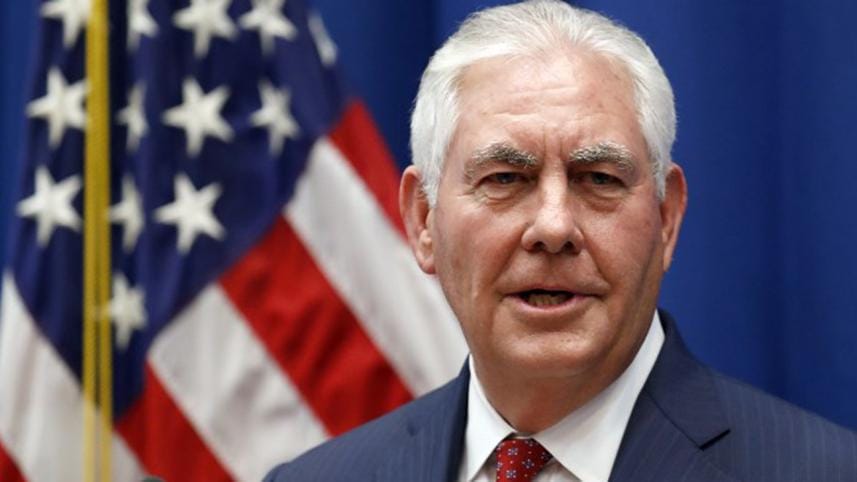Myanmar sanctions won’t solve Rohingya crisis: Tillerson

Washington's top diplomat today said he would not yet push for sanctions against Myanmar over the Rohingya refugee crisis, but he called for a independent investigation into "credible" allegations that soldiers were committing atrocities against the Muslim minority.
Secretary of State Rex Tillerson was speaking after a one-day stop in Naypyidaw, as global outrage builds over impunity for a military accused of waging an ethnic cleansing campaign against the Rohingya.
His comments came as de facto civilian leader Aung San Suu Kyi hit back at accusations that she has been silent over the refugee crisis, saying she has focused instead on speech that avoids inflaming sectarian tensions.
More than 600,000 Rohingya have fled the mainly Buddhist country since the military launched a counterinsurgency operation in northern Rakhine state in late August.
While Myanmar's military insists it has only targeted Rohingya rebels, refugees massing in grim Bangladeshi camps have described chilling and consistent accounts of widespread murder, rape and arson at the hands of security forces and Buddhist mobs.
Speaking after meetings with the army chief and Suu Kyi, Tillerson said that broad economic sanctions is "not something that I'd think would be advisable at this time."
"We want to see Myanmar succeed," he told reporters at a joint press briefing alongside Suu Kyi. "You can't just impose sanctions and say therefore the crisis is over."
But he said Washington was "deeply concerned by credible reports of widespread atrocities committed by Myanmar's security forces and vigilantes" and urged Myanmar to accept an independent investigation into those allegations.
"The scenes of what occurred out there are just horrific," he added.
Suu Kyi's administration has dismissed reports of atrocities and has refused to grant entry to UN investigators charged with probing those allegations.
- Powerless or complicit? -
But Washington has been careful to draw a distinction between Suu Kyi's fledgling civilian administration and the military, who controls all security policy.
While she lacks power over the army, Suu Kyi has become a punching bag for rights groups disappointed by her failure to publicly criticise the military or defend Rohingya against rising Islamaphobia.
Suu Kyi, who rarely holds press conferences, addressed those criticisms on Wednesday.
"I have not been silent... what people mean is what I say is not interesting enough," she told reporters.
"What I say is not meant to be exciting, it's meant to be accurate... not set people against each other."
The US was a major ally in the democratic transition that eventually led to Suu Kyi taking office in 2016 in a power-sharing arrangement with the army, ending five decades of brutal junta rule.
Under a junta-drafted constitution the military still controls key security ministries, including border and defence, and retains a de facto veto on any constitutional change.
Suu Kyi's defenders say she must tread lightly to avoid provoking an army that could roll back democratic gains at any time.
As anger over the plight of Rohingya mounts abroad, Myanmar's army has dug-in with its denial of abuses -- while also curbing access to the conflict zone.
Ahead of Tillerson's arrival the commander-in-chief published an internal probe that exonerated soldiers of all allegations, saying there was no evidence troops had killed civilians, raped women or used "excessive force" in Rakhine.
Rights groups blasted the report as an attempt to "whitewash" atrocities by a military with a long history of abuses, especially against ethnic minorities in border regions.



 For all latest news, follow The Daily Star's Google News channel.
For all latest news, follow The Daily Star's Google News channel.
Comments